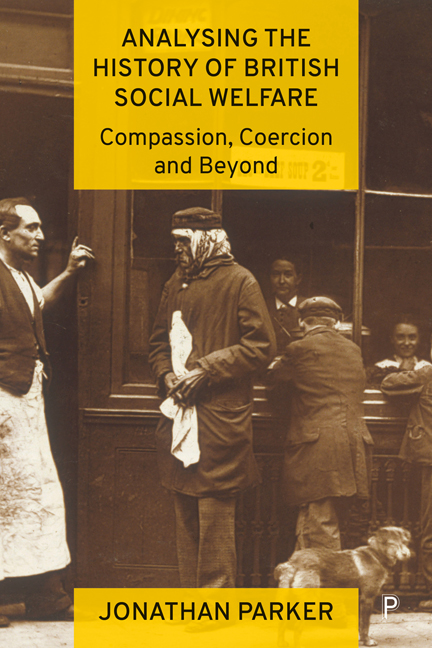Book contents
- Frontmatter
- Contents
- List of tables
- List of abbreviations
- About the author
- Acknowledgements
- 1 Concepts, continuities and critique
- 2 A brief history of British social welfare
- 3 Philosophical binaries and normative judgements
- 4 Chocolate, flowers and social welfare reform
- 5 War: the paradoxical crucible of welfare reform
- 6 Gendered perspectives on welfare
- 7 Piacular austerity: sacrificing the poor for the rich
- 8 Universal Credit versus Universal Basic Income: strange bedfellows?
- 9 Universal Credit versus Universal Basic Income: strange bedfellows?
- 10 W(h)ither welfare after Brexit and COVID-19?
- References
- Index
3 - Philosophical binaries and normative judgements
Published online by Cambridge University Press: 20 January 2024
- Frontmatter
- Contents
- List of tables
- List of abbreviations
- About the author
- Acknowledgements
- 1 Concepts, continuities and critique
- 2 A brief history of British social welfare
- 3 Philosophical binaries and normative judgements
- 4 Chocolate, flowers and social welfare reform
- 5 War: the paradoxical crucible of welfare reform
- 6 Gendered perspectives on welfare
- 7 Piacular austerity: sacrificing the poor for the rich
- 8 Universal Credit versus Universal Basic Income: strange bedfellows?
- 9 Universal Credit versus Universal Basic Income: strange bedfellows?
- 10 W(h)ither welfare after Brexit and COVID-19?
- References
- Index
Summary
In 2014, the prime minister at the time, David Cameron, set out a characterising claim for his government in a speech to the Relationships Alliance. He stated that the government was ‘on the side of hard-working families in Britain’ (Gov.UK, 2014). The claim created a clear division between people in need that he found acceptable and those that were not, thereby problematising those who were outside of families, out of work or might be construed as somehow workshy. While it raised, and continues to raise, many questions, the term ‘hard-working families’ has not been explained. This chapter examines the development and perpetuation of binary distinctions of such concepts as ‘deserving and undeserving’, ‘skivers and strivers’, and other judgemental views such as ‘bogus claimants’ or ‘broken Britain’. Such binaries and pejorative terms reflect the normative positions adopted within popular approaches to social welfare. Moreover, these contemporary understandings, which are tacitly accepted as givens, are explored within their historical contexts and continuities across time are examined as a means of illuminating the ambivalent social psychology inherent in our relationship with social welfare policy, practice and with those who receive it. They are political weapons that create and reinforce opposition.
The chapter outlines Lévi-Strauss’ position on binary distinctions, or more forcefully oppositions, and offers a critique of the normative positioning and power play that stem from these. The distinctions will be shown to underpin and influence the discourses and habitus of citizens. The critique will problematise binary thinking and the history of social welfare policies promoting and relying on such for their acceptance in wider society. Our period of analysis stems from the Elizabethan Poor Laws to contemporary times and, alongside the Poor Laws, considers gender relations, the amendments made to the Poor Law and 19th-century developments, the introduction of the welfare state and contemporary oppositional perspectives.
- Type
- Chapter
- Information
- Analysing the History of British Social WelfareCompassion, Coercion and Beyond, pp. 47 - 61Publisher: Bristol University PressPrint publication year: 2023



